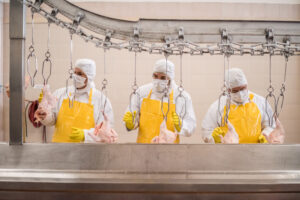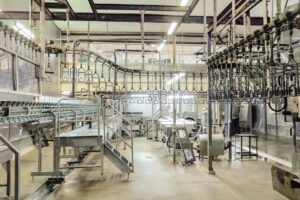
Trump’s Deregulatory Legacy: Harming Workers, Consumers, and Animals
By Holly Bainbridge
Staff Attorney
During his first term as president, Donald Trump took major steps to deregulate our food system, thereby putting workers, consumers, animals, and the environment at even greater risk. One of the most harmful deregulatory actions Trump took in his first presidency was increasing slaughterhouse line speeds while decreasing government inspections. A look back at Trump’s pro-industry approach to federal oversight of slaughterhouses can give us an idea of what’s to come over the next four years.
In meatpacking, “line speed” refers to the pace at which the animals are killed and processed on the production line. Through the Federal Meat Inspection Act and Poultry Products Inspection Act, the U.S. Department of Agriculture’s (USDA) Food Safety and Inspection Service (FSIS) has long imposed limits on slaughterhouse line speeds.
When Trump took office in 2016, the limit of how many pigs could be killed per hour was 1,106. In 2019, the Trump Administration finalized a rule eliminating the line speed limit at 40 high-volume slaughterhouses that are responsible for 93% of the pigs slaughtered in the United States. The rule also reduced the presence of FSIS inspectors on slaughter lines, while delegating inspection tasks to the slaughterhouses’ own workers. A court ultimately invalidated the line speeds portion of the rule in 2021, but the inspection portion remains in place.
Trump also rapidly expanded a waiver program that allows poultry processors to temporarily operate at 175 birds killed per minute – above the line speed limit of 140 birds per minute. At a time when COVID-19 was just beginning to ravage our country, poultry plants operating at higher line speeds were 10 times as likely to have coronavirus cases as plants without line-speed waivers. He then proposed a rule that would allow participating plants to permanently operate at this higher line speed and allow other plants to adopt the higher line speed without needing to apply for a waiver.
Meanwhile, the USDA approved an industry group petition to allow poultry slaughterhouses participating in the line speed waiver program to simply cut tumors off while continuing to process the rest of an affected bird. Biden ultimately withdrew Trump’s proposed rule that would allow the poultry operations to permanently operate at higher speeds.
Trump’s actions on line speeds and USDA inspections of slaughterhouses put more and more autonomy and control in the hands of big meatpackers. But fast line speeds, like those championed by the first Trump Administration, are devastating to worker safety, food safety, and animal welfare.
Dangerous Impacts on Workers
The most pressing concern with high line speeds is the toll they take on workers. When line speeds increase, workers are expected to process animals faster and complete tasks more quickly. Injuries like repetitive stress injuries, cuts, and even amputations become more common when workers are forced to work faster than they can safely manage. The mental and physical strain is unbearable for many, with workers reporting severe discomfort, exhaustion, and even psychological stress as they are pushed to meet ever-higher quotas.
Meatpacking is already one of the most dangerous industries in the United States, with workers facing high rates of injury due to the physically demanding and repetitive nature of the work. In fact, many workers report that even pre-Trump line speeds were too fast. For instance, Occupational Health and Safety Administration (OSHA) data shows that from 2015 to 2018, a meatpacking worker lost a body part or was sent to the hospital for in-patient treatment about every other day.
Matters are made even worse by large meatpackers systemically failing to report and treat worker injuries. For instance, workers have reported that supervisors will refuse to send a worker for medical treatment when they experience injuries, and even that on-site medical staff dismiss injuries without treatment.
Workers may then be forced to deal with chronic pain or permanent disability as a result of being pushed beyond their limits and having their injuries ignored.
Industry-wide lack of injury reporting also contributes to government’s failure to adequately address—and even actions to exacerbate—this pervasive problem.
Moreover, much of meatpacking labor is performed by immigrants, who are particularly vulnerable to the industry’s abuses, and face more serious consequences if their employer retaliates against them for speaking up. Trump’s anti-immigrant policies heading into his second term are a tool for keeping these workers in fear of speaking out against the exploitation that they suffer in the name of ever-increasing productivity.
Food Safety Risks
Higher line speeds in meatpacking also pose serious concerns for food safety. Processing meat involves numerous steps to ensure that the products are free from contaminants, such as bacteria or pathogens like E. coli and salmonella. One of the key safeguards in this process is the presence of FSIS inspectors who monitor the assembly lines to identify and remove any unsafe products. But when line speeds get pushed faster and faster, inspectors are forced to make less thorough reviews.
This is all made even worse by Trump’s reduction in the presence of FSIS inspectors in slaughterhouses and delegation of inspection tasks to slaughterhouse workers. Under Trump’s rule for pig slaughter, slaughterhouse workers are required to sort out sick and injured animals without an FSIS inspector ever seeing the animals. This poses real food safety risks because the slaughterhouse workers are not adequately trained in this area and may face pressure from their employers to hide animals away from FSIS’s view.
Animal Welfare Concerns
High line speeds also affect the treatment of animals in the slaughterhouse. Fast-paced slaughter lines often lead to inhumane conditions for the animals being processed. When lines move too quickly, animals may not be properly stunned before being slaughtered, leading to unnecessary suffering. Additionally, workers may not have the time to properly handle animals, increasing the likelihood of mishandling and cruelty.
Animals at large corporate slaughterhouses often suffer from mobility issues brought on by dangerous feed additives and inhumane breeding practices. This combined with faster line speeds creates unimaginably inhospitable conditions. FSIS inspectors are supposed to document and address animal cruelty in slaughterhouses – but again Trump worked to whittle away at their presence.
What’s Next?
By pushing for faster line speeds and reduced inspections, Trump clearly aligned his first administration with the corporate meatpacking giants that benefit from higher production rates, while showing little regard for the welfare of workers, consumers, and animals.
It is worth noting that the push for faster line speeds is not a Trump-alone problem. For instance, OSHA has never regulated line speeds despite the clear risk to workers – line speeds are only limited under the federal government’s food safety powers. In fact, in 2015 Obama’s OSHA rejected a petition by civil rights groups for slower line speeds for worker safety. And Trump’s updates to pig slaughter were the culmination of pilot programs that started in 1997 under Clinton. It goes to show how deep the meatpacking industry’s ties to our federal government run.
Of course, this is just one of many ways in which Trump’s deregulatory agenda let industrial animal agriculture run rampant over his first four years in office. Trump is unsurprisingly positioned to carry his pro-industry agenda into his second term. Project 2025 promotes reduced government intervention in agriculture, food safety, and climate change. Trump’s promises of mass deportation will be devastating to the workers who put food on our tables, and we expect industry to take advantage of this devastation to gain more power over its workers.
At FarmSTAND, we fought Trump and his corporate beneficiaries last time, and we’re prepared to do it again.
We’re representing workers before the EEOC to stop JBS—the largest meatpacking company in the world—from discriminatorily forcing Haitian workers to endure unsafe line speeds. We’ve sued Livingston Enterprises and Worldwide Farmers Exchange for deceiving foreign citizens into travelling to the U.S. on J-1 exchange visas, advertising an educational internship when, in reality, they intend to use them for cheap general labor. And we’re fighting before the Michigan Supreme Court to allow undocumented workers who suffer serious workplace injuries to access workers’ compensation wages while they are recovering. We will continue to fight alongside workers, communities, and farmers for a fair food system that works for the people in it.


